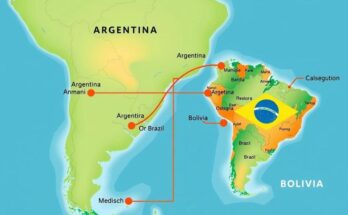Li Ka-shing, Hong Kong’s wealthiest man, faces backlash over CK Hutchison’s sale of Panama Canal port assets to a consortium involving BlackRock, causing anger in Beijing. The deal raises concerns regarding loyalty to the Communist Party and highlights the challenges Hong Kong businesses encounter in navigating these dual pressures. The situation underscores increasing geopolitical complexities and the significance of the deal in terms of strategic asset management and international relations.
Li Ka-shing, the wealthiest individual in Hong Kong and chairman of CK Hutchison Holdings, finds himself facing scrutiny following his company’s decision to sell Panama Canal port assets to a group that includes BlackRock, a prominent U.S. investment firm. This development has seemingly provoked discontent from Beijing, which has voiced its sentiments through state-backed media commentaries criticizing the deal. The situation underscores the challenges Hong Kong businesses encounter in reconciling loyalty to Beijing with their capitalistic operations in Hong Kong.
Li, often referred to as “Superman,” boasts a net worth of $38 billion according to Forbes, placing him among the world’s wealthiest individuals. Although he stepped down as chairman in 2018, his influence persists within the business landscape of Hong Kong. His extensive business interests encompass sectors such as telecommunications, supermarkets, and utilities, both locally and globally.
CK Hutchison has operated ports at both ends of the Panama Canal since 1997, which has led to allegations of Chinese influence over key shipping operations. Li’s political ties are notable, having collaborated with Chinese leaders, indicating a complex relationship between business and governance in Hong Kong as the Communist Party recognizes the significance of the business community in maintaining its economic model.
The Panama ports deal, announced on March 4, involves the sale of CK Hutchison’s shares in Hutchison Port Holdings and Hutchison Port Group Holdings to a consortium, including BlackRock’s Global Infrastructure Partners. Valued at approximately $23 billion, this transaction would enable the consortium to manage multiple ports across various countries, excluding those in Hong Kong or mainland China.
Responses from Beijing have been hostile, with local media labeling the deal as a betrayal. Commentaries emphasized the need for patriotism among business leaders and chastised any cooperation with American interests. Within Hong Kong, Chief Executive John Lee refrained from direct criticism but reiterated a need to oppose international economic coercion, aligning with Beijing’s perspective.
The situation remains delicate, as reports suggest Chinese leaders felt alienated by not being consulted earlier about this sale. The strategic value of ports heightens the sensitivity of such transactions, making this a complex landscape for Li and CK Hutchison. The future of the deal rests on the approval of Panama’s government, while CK Hutchison remains silent on the controversy, with financial results forthcoming but without a scheduled press conference.
Long-term ramifications of this situation could be significant. Following past sanctions imposed during the Trump administration, which targeted officials undermining Hong Kong’s autonomy, any pressure from Beijing on Li to retract the deal might result in potential further sanctions from Washington. Observers note that the integrity of Hong Kong’s business environment under the “one country, two systems” framework is increasingly under question due to growing tensions between private enterprises and the Communist Party’s directives.
The scrutiny surrounding Li Ka-shing’s Panama port deal illustrates the conflicted allegiance of Hong Kong businesses to both Beijing and their capitalist interests. As tensions amplify, the potential geopolitical ramifications and pressures on business leaders become increasingly complex. The evolving political landscape necessitates a careful balancing act, where the outcomes of such deals may not only impact individual interests but also the broader perception of Hong Kong’s autonomy and economic standing in the global arena.
Original Source: apnews.com




